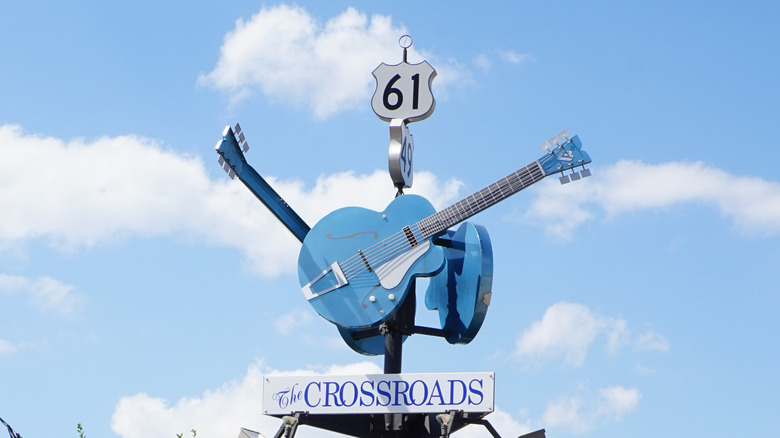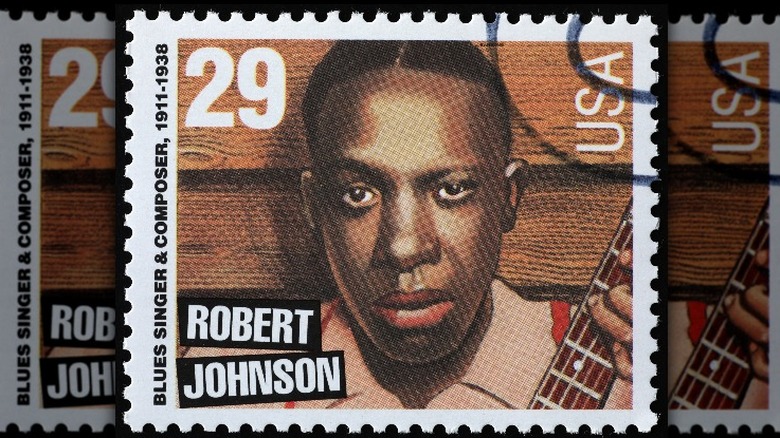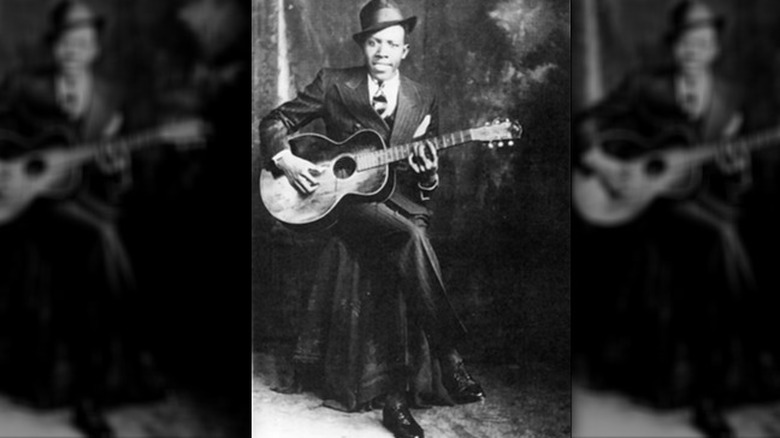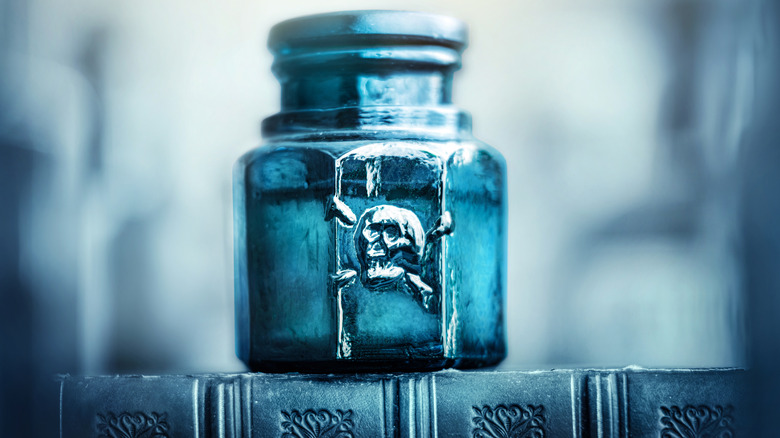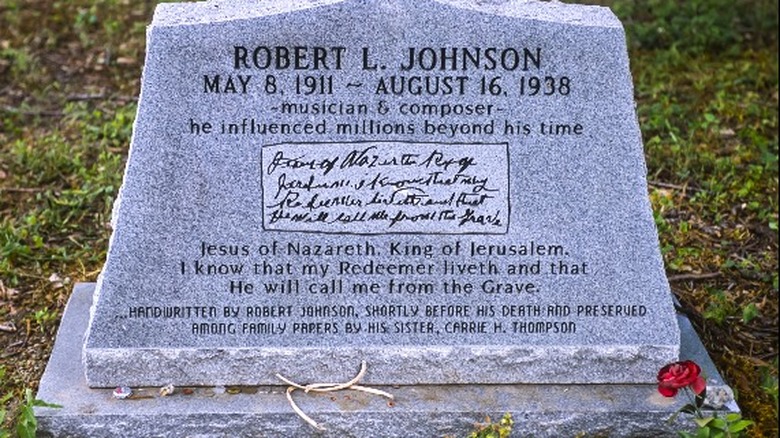The Mysterious 1938 Death Of Robert Johnson
In the Mississippi Delta, where highways 49 and 61 meet, legend has it the devil patiently waits for aspiring blues musicians –- who are willing to exchange their souls for fortune and fame. The intersection, which is known as "the crossroads," has inspired several films, songs, and other works of art. However, as reported by The Clark House Inn, the intersection is best known as the location where blues musician Robert Johnson reportedly sold his soul for the gift of musical talent, or so the myth goes.
According to National Blues Musician, Johnson had a passion for singing and playing the guitar. However, he lacked the skill to make a career of it. Johnson essentially vanished from the scene for approximately six months or three years in the early 1930s — depending on the source. When he returned to the stage, his guitar playing had vastly improved and he went on to become a musical legend who inspired blues and rock musicians for decades to come.
Johnson's unique — and seemingly unexplainable — talent led to rumors that he made a deal with the devil at the crossroads. Some of Johnson's songs, including, "Cross Road Blues," "Hellhound on My Trail," and "Me and the Devil Blues," only fueled the rumors. As reported by American Blues Scene, the rumors likely originated with an interview, in which blues musician Son House said, "He must have sold his soul to the devil to be able to" play with such remarkable skill.
Robert Johnson's life and death both remain controversial
The legend of Robert Johnson's deal with the devil persists to this day and includes rumors that he was seen at the crossroads on the evening he died. According to The Clark House Inn, Johnson was reportedly on his knees "howling at the moon," shortly before he died. Although the validity of the legend, and Johnson's experience of the crossroads, are questionable, the details surrounding his death are also unusual and remain a point of speculation and controversy.
A native of Hazelhurst, Mississippi, Johnson was born on May 8, 1911. While growing up on a plantation, he spent his free time playing the guitar. As reported by NPR, Johnson did not seem to possess a natural musical talent. However, his passion compelled him to continue improving his skills.
Although Johnson did leave Mississippi for a period of time, he spent that time taking lessons and practicing the guitar. He also gained experience working as a traveling musician and performing in various juke joints. By 1936, he improved to the point where he was offered an opportunity to begin recording his songs. Biography reports Johnson recorded a total of 29 songs between 1936 and 1937. He also managed to secure his reputation as a talented musician. However, his fame was short-lived, as Johnson died on August 16, 1938, at the age of 27.
Robert Johnson's cause of death remains unknown
As reported by Mother Jones, Robert Johnson's mother, Julia, said she was by his side when he died. She said Johnson knew he was dying and had been waiting for her to arrive. According to Julia, Johnson said he wanted her to take his guitar and hang it on the wall because he thought it brought him bad luck. Julia said his last words were, "It's the devil's instrument ... And I don't want it no more." However, her account has been disputed and remains controversial.
Robert Johnson's actual cause of death is not known. As reported by U DiscoverMusic, Johnson's cause of death is not listed on his death certificate, and it is unknown whether an autopsy was ever performed.
In the years following his death, some doctors have suggested Johnson died of complications related to pre-existing medical conditions. According to U DiscoverMusic, at least one doctor suggested Robert Johnson was born with congenital syphilis. As Johnson was known to be a heavy drinker, the doctor believes he may have died from an aneurysm as a result of syphilis complications combined with his drinking. Mother Jones reports Johnson's landlord also suggested he died of complications related to syphilis. In 2006, Dr. David Connell published an article in the British Medical Journal, in which he suggests Johnson may have had Marfan syndrome, a condition that could have contributed to his death.
Some rumors suggest Robert Johnson was poisoned
Dr. David Connell also shared his findings in an open letter to musician Eric Clapton. In the letter, which was made available by the National Library of Medicine, Connell cited photographs of Robert Johnson -– in which his fingers appear to be unusually long. He also noted Johnson had a "bad eye," which had a recurring cataract. Connell believes those features suggest Johnson had Marfan syndrome.
According to the Centers for Disease Control and Prevention, Marfan syndrome is a genetic disorder, which affects the body's connective tissues and can also cause damage to the eyes, heart, and lungs. One of the more dangerous complications related to Marfan syndrome is the enlargement of the aorta, which can cause a life-threatening aortic aneurysm or a deadly aortic dissection.
In his open letter to Clapton, Connell said he witnessed a young woman who died of an aortic dissection associated with Marfan syndrome. In his words, she died "on her hands and knees howling like a dog," which was eerily similar to some of the rumors about Johnson's own death.
Although some of the possible explanations for Johnson's death are related to pre-existing medical conditions, the most prevailing theories suggest he was murdered by poisoning. As reported by Mother Jones, Johnson's friend, musician David "Honeyboy" Edwards, claims he witnessed Johnson being poisoned. According to Edwards, Johnson was romantically involved with a woman, who already had a boyfriend. Edwards claims the woman's boyfriend was responsible for Johnson's death.
The location where Robert Johnson was buried is also controversial
As reported by Mother Jones, David "Honeyboy" Edwards said the jealous boyfriend put poison in a glass of corn whiskey. He then placed the glass on the stage where Robert Johnson was performing. When Johnson began feeling ill during his performance, Edwards took him to a friend's home -– where he eventually succumbed to the illness. Following his friend's death, Edwards said, "Robert loved whiskey and women ... and some women you got to leave alone, you know what I mean?"
Johnson's supposed deal with the devil and his cause of death are not the only mysteries surrounding the talented blues musician. It is also unclear where the legend was buried. Atlas Obscura reports there are two memorial markers bearing Johnson's name, which are believed to be gravestones. It is unknown which marker was placed at the actual location where Johnson was buried.
Although Johnson's death certificate did not indicate his cause of death, it mentions a "Zion Church," which was assumed to be the location of his burial. According to Mother Jones, Johnson's half-sister learned he was buried in a homemade casket of questionable quality years after his death. As she wanted Johnson to be buried in a more substantial casket, she hired an undertaker named Paul McDonald. According to McDonald's records, Johnson's remains were removed from his grave at the Little Zion Baptist Church, placed in a new casket, and reburied in the same cemetery.
